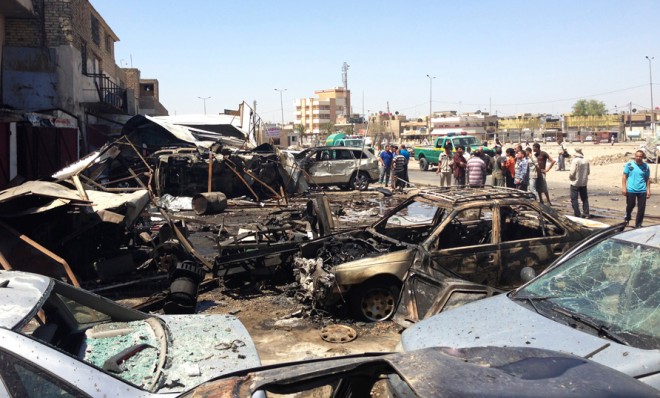How al Qaeda staged a comeback in Iraq
The terror network's local arm has pushed deadly violence to a level not seen in years


A free daily email with the biggest news stories of the day – and the best features from TheWeek.com
You are now subscribed
Your newsletter sign-up was successful
Al Qaeda's affiliate in Iraq has claimed responsibility for a wave of bombings that has driven deadly violence in the country to its worst level in years.
The latest attacks — most of them committed by Sunni Muslim insurgents against Shiites — killed dozens of people during the Eid al-Fitr festival marking the end of the holy month of Ramadan. More than 670 people were killed over the month, making it the deadliest Ramadan in Iraq since 2007.
The violence underscores the fragility of Iraq's democracy, and how badly the security situation has deteriorated since the withdrawal of U.S. forces at the end of 2011. Al Qaeda was once on the run in the country. How did it manage to regroup so fast?
The Week
Escape your echo chamber. Get the facts behind the news, plus analysis from multiple perspectives.

Sign up for The Week's Free Newsletters
From our morning news briefing to a weekly Good News Newsletter, get the best of The Week delivered directly to your inbox.
From our morning news briefing to a weekly Good News Newsletter, get the best of The Week delivered directly to your inbox.
The short answer is that the departure of American forces left a security void that gave al Qaeda and other insurgent groups an opportunity to regain strength. Retired Army Gen. David Petraeus, then the U.S. commander in Iraq, warned Congress in 2007 that Iraq would backslide if American forces were pulled out prematurely.
That's not the only reason for al Qaeda's revival, however. Ashish Kumar Sen at The Washington Times suggests that the Shiite-dominated government of Prime Minister Nouri al-Maliki bears a significant share of the blame, fueling the insurgency by marginalizing his Sunni political rivals.
One example was the April killing of dozens of Sunni anti-government protesters by security forces in the northern city of al-Hawijah, which "sparked a surge in al Qaeda recruitment," says Sen. Insurgents hit back in July with a daring prison break that freed hundreds of militants. Analysts tell Sen that if Iraq had put together a national unity government, the situation might have been different. Instead, Maliki's government has favored the Shia majority over the Sunni minority, Sen says, causing Sunni tribes that once rejected al Qaeda to start supporting it again.
Maliki's mistakes include just plain bad governance, reflected in poor basic services despite a surge in oil income. But while his failings are certainly part of the problem, external factors have made matters worse. "The civil war in Syria has energized regional jihadis," says Dan Murphy at The Christian Science Monitor, "and the flow of arms and men across the porous Iraqi-Syrian border have created more opportunities for fighters inside Iraq."
A free daily email with the biggest news stories of the day – and the best features from TheWeek.com
There's a simpler, scarier reason for al Qaeda's resurgence, though. As Bruce Reidel notes at The Daily Beast, the terror network has an impressive ability to adapt and bounce back from adversity.
The regeneration of al Qaeda in Iraq and its expansion into Syria is a warning to American decision makers. Few al Qaeda franchises or associated movements have ever been permanently destroyed. They can be disrupted and dismantled and yet fully regenerate once the pressure subsides. [Daily Beast]
Harold Maass is a contributing editor at The Week. He has been writing for The Week since the 2001 debut of the U.S. print edition and served as editor of TheWeek.com when it launched in 2008. Harold started his career as a newspaper reporter in South Florida and Haiti. He has previously worked for a variety of news outlets, including The Miami Herald, ABC News and Fox News, and for several years wrote a daily roundup of financial news for The Week and Yahoo Finance.
-
 How the FCC’s ‘equal time’ rule works
How the FCC’s ‘equal time’ rule worksIn the Spotlight The law is at the heart of the Colbert-CBS conflict
-
 What is the endgame in the DHS shutdown?
What is the endgame in the DHS shutdown?Today’s Big Question Democrats want to rein in ICE’s immigration crackdown
-
 ‘Poor time management isn’t just an inconvenience’
‘Poor time management isn’t just an inconvenience’Instant Opinion Opinion, comment and editorials of the day
